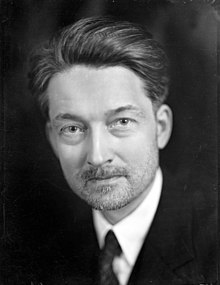
Back جاك ماريتان Arabic جاك ماريتان ARZ Jak Mariten Azerbaijani Жак Марытэн Byelorussian Jacques Maritain Catalan Jacques Maritain Czech Jacques Maritain Welsh Jacques Maritain German Jacques Maritain Spanish Jacques Maritain Estonian
This article includes a list of general references, but it lacks sufficient corresponding inline citations. (November 2010) |
Jacques Maritain | |
|---|---|
 Maritain in the 1930s | |
| Born | 18 November 1882 Paris, France |
| Died | 28 April 1973 (aged 90) Toulouse, France |
| Alma mater | University of Paris |
| Notable work |
|
| Spouse | |
| Era | 20th-century philosophy |
| Region | Western philosophy |
| School | Existential Thomism |
Main interests | |
| Part of a series on |
| Christian democracy |
|---|
 |
|
|
| This article is part of a series on |
| Conservatism in France |
|---|
 |
| Part of a series on |
| Catholic philosophy |
|---|
   |
Jacques Maritain (French: [ʒak maʁitɛ̃]; 18 November 1882 – 28 April 1973) was a French Catholic philosopher. Raised as a Protestant, he was agnostic before converting to Catholicism in 1906. An author of more than 60 books, he helped to revive Thomas Aquinas for modern times, and was influential in the development and drafting of the Universal Declaration of Human Rights. Pope Paul VI presented his "Message to Men of Thought and of Science" at the close of Vatican II to Maritain, his long-time friend and mentor. The same pope had seriously considered making him a lay cardinal, but Maritain rejected it.[3] Maritain's interest and works spanned many aspects of philosophy, including aesthetics, political theory, philosophy of science, metaphysics, the nature of education, liturgy and ecclesiology.
- ^ Deweer, Dries (2013). "The Political Theory of Personalism: Maritain and Mounier on Personhood and Citizenship" (PDF). International Journal of Philosophy and Theology. 74 (2): 115. doi:10.1080/21692327.2013.809869. ISSN 2169-2335. S2CID 153676163.
- ^ Granpré Molière, Marinus Jan. "Een wonderlijk gesprek over schilderen en tapijtweven". DBNL. Roeping. Jaargang 29. Retrieved 15 July 2023.
- ^ Donald DeMarco. "The Christian Personalism of Jacques Maritain". EWTN. Archived from the original on 5 December 2000.
© MMXXIII Rich X Search. We shall prevail. All rights reserved. Rich X Search